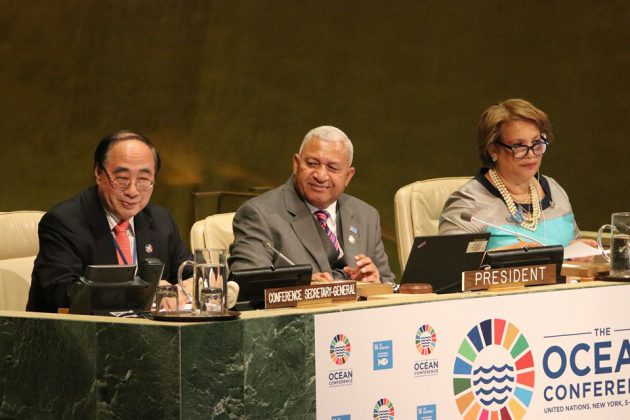
AUCKLAND (Asia Pacific Report/Pacific Media Watch): Political leaders from across the Pacific have played a central role in talks this week surrounding healthier oceans during the UN Ocean Conference in New York, with Fiji Prime Minister Voreqe Bainimarama calling for a “global crusade”.
Co-hosted by Fiji and Sweden, the “game changing” conference aims to see Sustainable Development Goal 14 – the conservation and sustainable use of the world’s oceans and its resources – become a reality.
During his opening address, Prime Minister Bainimarama appealed for the world’s population of 7.5 billion people to join Fiji in ensuring the health of oceans is improved, The Fiji Times‘ Tevita Vuibau reported.
“Let us all seize this moment in history to make a difference. To place SDG 14 at the very top of the global agenda alongside decisive climate change. We can do it. We must do it. The alternative in both cases is catastrophe.”
Bainimarama, a president of the conference alongside Swedish Deputy Prime Minister Isabella Lövin, highlighted this was urgent due to the rapid deterioration of ocean fish stocks and the polluted state of the world’s oceans.
“So much of what we dispose of carelessly finally ends up in our seas through storm water drains, creeks and rivers,” he said. “Our waterways are choking. Our seas and oceans have become vast rubbish dumps. And the creatures who live in them are suffering acutely – turtles, dolphins and sharks caught in netting, whales with stomachs full of plastic bags and other rubbish.
‘Precious’ resource dying
“Humankind is slowly killing off one of our most precious resources – the rich bounty of our seas and oceans that generations across the millennia have relied upon for sustenance, and to earn a living.”
Palau’s president Tommy Remengesau also called for 30 percent of the world’s oceans to be protected by 2030, Radio New Zealand International reported.
Palau had already set aside 80 percent of its seas as a no-take marine sanctuary, so other countries should work together to establish a system of protected areas, he said.
“Within this worldwide network of protected areas, we must take into account the need for sustainable development and create opportunities for food security initiatives in developing countries enhancing small-scale and artisanal fisheries and building capacity in sustainable fisheries, tourism, and aquaculture.”
This work is licensed under a Creative Commons Attribution-NonCommercial 3




